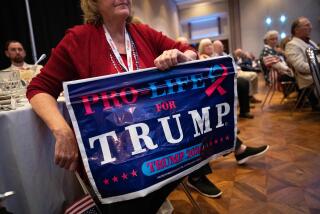Column: Trump and GOP lawmakers are making it easier for auto dealers to racially discriminate
Senate Republicans have voted to allow car dealers to discriminate against black and Latino customers.
Maybe I could have phrased that more delicately so as not to bruise sensitive conservative feelings. But why bother?
In voting last week to repeal an Obama-era guideline from the Consumer Financial Protection Bureau, Republican senators made clear that the ability of car dealers to jack up prices for some customers — read: people of color — is more important than ensuring everyone is treated fairly.
A vote by the Republican-controlled House of Representatives could come as soon as Tuesday. The Trump administration has signaled it would sign any such bill into law.
Senate Majority Leader Mitch McConnell (R-Ky.), with characteristic misdirection, said conservative lawmakers “want to protect consumers and job creators from needless interference by the federal bureaucracy.”
He called the CFPB guideline “a particularly egregious overstep” by federal regulators, and said overturning it represented “another victory in this Congress’ record of rolling back overregulation.”
Let’s dispense with that nonsense right off the bat.
In no way are Republicans protecting consumers with this vote. Just the opposite. It’s pitiful for them to pretend otherwise.
Nor are they protecting “job creators,” which has become the go-to conservative euphemism for anyone with money to throw around Capitol Hill.
The reality is that U.S. vehicle manufacturers are cutting jobs as sales of passenger cars decline, and that in turn affects staffing at dealerships. In February, General Motors slashed the amount salespeople can earn in bonus payments.
So let’s look instead at what McConnell sees as the particular egregiousness of the CFPB’s guidance.
What it’s intended to address is the amount dealers can boost interest rates for auto loans. Most lenders allow dealers to wet their beaks in this way, permitting them to pocket some or all of the difference the higher rates produce.
Studies have found that such markups frequently are higher for black and Latino borrowers than they are for white car buyers.
In January, the National Fair Housing Alliance released a report on what happened after it sent undercover buyers to eight dealerships in Virginia. In each case, a white and a non-white person inquired about financing for the same car.
Just to make things really interesting, the non-white buyers had higher credit scores than the white ones.
Nearly two-thirds of the time, the alliance found, the non-white car buyers received more costly pricing options, requiring them to pay about $2,600 more than white buyers over the life of the loan.
Also, the white buyers were offered more financing alternatives than non-white buyers 75% of the time.
“Overall, this investigation found that, when auto dealers have pricing elements at their discretion, there is an opportunity for discrimination to occur,” the report concluded. “This investigation revealed that, more often than not, auto dealers took that opportunity to discriminate.”
Debbie Goldstein, executive vice president of the Center for Responsible Lending, told me such practices have been an open secret in the auto industry for many years.
“People just aren’t treated with fairness and respect by dealers,” she said.
In 2013, the CFPB concluded that “potentially discriminatory markups in auto lending may result in tens of millions of dollars in consumer harm each year.”
It issued a guideline reminding dealers and lenders that the Equal Credit Opportunity Act “makes it illegal for a creditor to discriminate in any aspect of a credit transaction on prohibited bases, including race, color, religion, national origin, sex, marital status and age.”
A handful of lenders reached related settlements with the CFPB and Justice Department between 2013 and 2016. Ally Financial, the former lending division of General Motors, and the lending arms of Toyota and Honda refunded more than $125 million to minority borrowers. Toyota and Honda also agreed to limit their dealers’ markups.
The National Automobile Dealers Assn. lobbied aggressively for lawmakers to overturn the agency’s guidance, and there was at least one legislative attempt to do just that. But it failed to pass.
Republicans are now exploiting a ruling they sought in December from the Government Accountability Office, which said the CFPB should have issued a formal rule in 2013 rather than an informal guideline. That opened the door to lawmakers revisiting the CFPB’s decision with a simple party-line majority vote.
The dealers association misleadingly characterizes the interest-rate flexibility as allowing dealers to provide discounted rates to customers, rather than going in the other direction with markups.
Peter Welch, chief executive of the association, said in a statement that the Senate bill is “a measured response to the CFPB’s attempt to regulate the $1.1 trillion auto financing market.”
Again, the bureau wasn’t regulating anything. It was simply serving notice that federal law requires no racial discrimination in lending, and that it would be watching the market for violations of the law.
As with all their criticism of the CFPB, conservative lawmakers spun the guideline as an example of a regulatory agency riding roughshod over decent, hardworking American businesses.
Sen. Jerry Moran, a Kansas Republican, spearheaded the legislation. He said he was blocking the CFPB from “proceeding down the path of an aggressive enforcement action in search of ‘market-tipping settlements.’”
By that, I assume he means the bureau was proceeding down the path of holding auto dealers accountable for skeevy, racist practices.
Coincidentally, the dealers association has contributed $73,500 to Moran over the course of his political career, according to the Center for Responsive Politics.
It has given about $4.7 million so far in the 2018 election cycle. Eighty-two percent of those contributions have gone to Republicans.
In the 2016 election cycle, auto dealers contributed more than $22 million, with 78% of that total going to Republicans.
Amit Narang, a regulatory policy advocate with Public Citizen, noted that White House budget chief Mick Mulvaney, President Trump’s choice to run the CFPB on an interim basis, could have overturned the bureau’s auto-lending guidance “just by snapping his fingers.”
“Apparently the Senate majority is more interested in helping vulnerable incumbents raise campaign cash from the powerful and well-heeled auto lobby than in protecting consumers who are being charged more for car loans based on the color of their skin,” he said.
That’s as good an explanation as any for such a thoughtless, mean-spirited action.
David Lazarus’ column runs Tuesdays and Fridays. He also can be seen daily on KTLA-TV Channel 5 and followed on Twitter @Davidlaz. Send your tips or feedback to david.lazarus@latimes.com.







